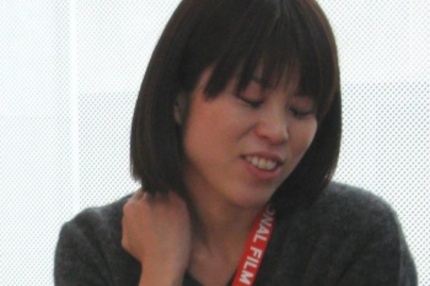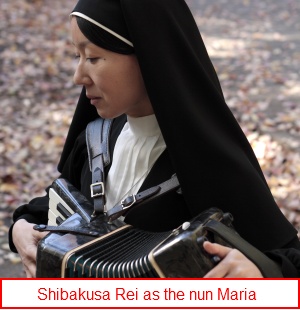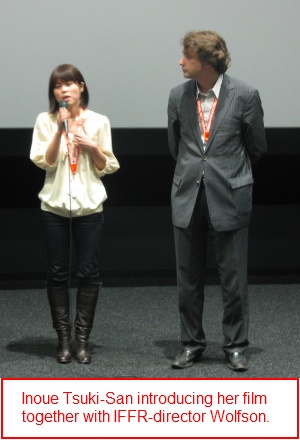IFFR 2010: An interview with Inoue Tsuki, director of AUTUMN ADAGIO

This year the International Film Festival Rotterdam had two Japanese films in its Tiger Competition, one of which being the gentle realizing-of-age drama "Autumn Adagio" by director Inoue Tsuki. The film depicts a Japanese Catholic nun who, on turning forty, rediscovers the joys and hazards of physical attraction through music, dance, and human contact.
It was well-received by audiences and critics alike (me included), mostly because Inoue Tsuki treats the subject respectfully and without any of the more obvious jokes. As a first full-length feature (her previous film "The Woman Who Is Beating the Earth" is technically a long short) it's a very mature debut.
The day before the Tiger Award ceremony she kindly allowed us some of her time for an interview.
AV: During the Q&A after the World Premiere of "Autumn Adagio" you mentioned that you made the movie with an international audience in mind, inserting non-Japanese aspects like Catholic faith and ballet on purpose. Do you think this will make it difficult to market the movie in Japan itself?
Inoue Tsuki-San: Japan is still suffering from the economic crisis. This makes it difficult to get small films financed and shown, so to me it seemed like a good idea to aim for an international audience. Even to get noticed for national distribution you need to pay attention to markets worldwide. My previous film "The Woman Who Is Beating the Earth" was also shown in international festivals last year, and I'd have liked to have been there as well but I was already too busy with "Autumn Adagio" to be able to follow it all over the world.
AV: "Autumn Adagio" is your first full-length feature and completely revolves around the central character, played by Shibakusa Rei who is actually known as a musician instead of as an actress. I've heard that many people in the film are not professional actors, yet the acting throughout seems very natural. What is your approach to directing actors?

Inoue Tsuki-San: Rei is indeed a musician who writes songs and she can play piano for real. I specifically wanted people in the film who could really do what they had to portray. So when you see ballet dancers or musicians it's not a trained performance, instead I'm just filming what they already do. That way I don't necessarily need professional actors and I also think it's more interesting to work with people like that. For starters you never know exactly what they'll do during the shoot! Sometimes this can lead to failure but often you happen to catch something special. In that way I think there is more cinematic potential in non-professional actors.
AV: The artform you choose in the film to confront the nun Maria with her feelings is ballet. Why specifically ballet, apart from the international accessibility?
Inoue Tsuki-San: There are several reasons for this. The first one is that you have this nun, who is pure, unspoilt, and instead of her suddenly feeling attracted to men I needed to show an inbetween phase. The world of ballet has the same sense of discipline and stoicism that life in a monastery offers, so I chose to use ballet to portray this "inbetween phase".
The second reason is that I used to dance a lot, and for a while I even wanted to become a professional ballet dancer myself. So I also put it in the movie just because I happen to like it so much, it's so beautiful.
Also, Christianity and ballet are both Western influences on Japanese society, so they sort-of fit together in that way.
AV: I have to confess that I really loved the ballet sequences in the film. Especially the scenes where there is just ballet and piano music are in my opinion amongst the best uses of ballet I've yet seen in a film. Was a lot of time spent on choreography or did you just tell the dancers to "do something beautiful"?
Inoue Tsuki-San: The latter. We spent a lot of time on the score, and the beginning and end themes were specially composed for the film by Rei herself although it was based on an existing psalm. The dancing, however, was just improvisation by Kazuhiro Nakajima combined with regular exercises and such.
AV: It helps of course that Kazuhiro Nakajima also beats Takeshi Kaneshiro on looks. At least, that's what my wife says of course. Ahem...
Inoue Tsuki-San: Hahaha!
AV: Back to the subject of financing, I've heard you used the prize-money you won with "The Woman Who Is Beating the Earth" to film "Autumn Adagio". Can I ask how much it cost and how you got the rest of the financing for such a project done?
Inoue Tsuki-San: I won two million Yen (about 20,000 US Dollar) at the 2008 Fantastic Film Festival of Yubari, and I worked really hard in several jobs to get the remaining million Yen. Together that is the complete budget: three million Yen, say 30,000 dollars.
When I speak to other Asian filmmakers at festivals like these, they all think Japan is very rich and that there is much money to make films. But in productions like mine you have to make every penny count, same as they do. It means most small-scale directors in Japan have another job apart from filmmaking, just to be able to finance their own films. You're always hanging on by your fingernails.
AV: Well, hopefully you'll win a Tiger Award here in Rotterdam. I have to say that in previous years we always only interviewed one Tiger nominee, and that person would win one. Maybe I should keep my mouth shut before I jinx it...

Inoue Tsuki-San: Haha! (In English) "Thank you very much."
I was doing a Q&A with people from the Rotterdam Film Academy, and when we discussed finance someone suddenly asked me to which social class I belonged. That question really surprised me because I don't see myself as coming from a particularly privileged kind of background. I explained that in the Japanese film industry social class isn't an issue, and I was very surprised that so many people assume that it is. Even other Asian filmmakers! And while everybody assumes that other countries are financially less well-off than Japan is, I noticed that a lot of filmmakers from other Asian countries actually belong to a rich upper-class themselves. They were among the few people able to go to universities and could arrange funds to have their films made. Compared to that the movie business in Japan is wide open for everyone. Thanks to new technologies, as long as you have a computer and a camera you can make a cheap film.
AV: Do you already have a next movie in mind which you're trying to get financed?
Inoue Tsuki-San: Nothing concrete yet. But during the screenings here in Rotterdam of "Autumn Adagio" I saw a lot of young couples coming in with buckets of popcorn, and leave at the end with puzzled expressions on their faces. So next time I want to make a film that is more entertaining for a lot of different age groups. Maybe even a musical or something like that.
AV: Well, audience reactions here in Rotterdam so far are actually very positive. If I look at online Dutch reviews I see a lot of praise for your movie. I also think "Autumn Adagio" is pretty easy for audiences to appreciate. I mean, it's not like nobody ever turns forty in real life...
Inoue Tsuki-San: At one screening I was seated next to a couple and the guy was constantly asking his girlfriend "Are you sure you like this? Are you sure you're enjoying this?". So I got the impression that I was totally ruining their evening with my film... (we all laugh).
AV: The screening I saw a few days ago was the World Premiere. I've heard other filmmakers say that this is about the most scary thing a person can experience, especially if it's your first long feature. What did you feel that evening?
Inoue Tsuki-San: Yes, I was incredibly nervous. To watch the film on such a large screen with so many people present, well... I sure won't see that happening in Japan. And also, you hear people talk and you get the first reactions, and that is really the moment where you get the feeling that your film is finally completed. That it's been finished. Almost like you went to a pet store to buy a fish, and when you get home and put the fish in a bowl, that's the moment you can watch it.
AV: I've already said that I think the film looks very beautiful, and part of that is because of the cinematography. Did you work the camera yourself?
Inoue Tsuki-San: No, I always use the same cameraman: Ohmori Yôhei. He does not have much experience with feature-length movies, but he has worked a lot on music videos and I like his work.
AV: Aha, that probably explains why the dancing looked so good. Because I really think those scenes stand out.
Inoue Tsuki-San: Yes.
AV: I also want to ask you about the location. You managed to film in an actual church. Did you have trouble getting permission to shoot your film there? The Catholic church is very wary of its image, especially these days. I can imagine that if you ask a priest if you can use his church to make a movie about a 40-year old nun who experiences a sexual revolution, the answer will be: "WHAT?"
Inoue Tsuki-San: It wasn't easy. I'm not a Catholic myself so I tried to get things arranged with the help of Catholic friends, but the answer was always "No". I decided that the only way I could earn the trust of these people was to attend Mass each week and get to know the priest better, so I did, and finally I got permission to film inside the church itself. But it was a Protestant church, not a Catholic one. So we ended up using two churches in the film: the one you see from the outside is an actual Catholic church, while for inside shots we used the Protestant church.
AV: Funnily enough I get the impression the situation would be reversed over here in The Netherlands. We are a Calvinist country and the Protestants are (generally speaking) more strict here than the Catholics are. Because of that I'd have guessed you might have been able to shoot in a Catholic church, but not in a Protestant one.
Inoue Tsuki-San: Well, that's not what I encountered in Japan.
I had long talks with the Protestant priest who finally allowed me the use of his church. He was a Frenchman, and he felt he agreed with the story but he did ask me to stress that Maria doesn't leave the monastery at the end.
AV: Why, was that originally in the script? Maria leaving the monastery?
Inoue Tsuki-San: No, she already stayed there in the very first scenario I wrote. There are so many films that start with people in a monastery and show them leaving it! I thought it would be more interesting and original to show someone who doesn't.
And that was the end of the interview. I agreed with her last comment and we did continue talking for a while, but that was just me saying how much I liked the movie so that's technically speaking not an interview.
However, we did discuss one of the questions which came up during the Q&A following the World Premiere, and it is too interesting to leave out.
Do note that it describes a very specific and important point of the plot so consider this to be a major ***SPOILER WARNING***. If you want to remain "unspoilt", scroll onward till the big picture below.
AV: In your film there is a rape, and afterwards when the victim meets the rapist she forgives him, saying that it was also her fault and that she actually wanted it to happen. That is quite a statement and it left me a little uncomfortable. Frankly, I think that if I as a Western male director would have put that in a film I would have been publicly crucified. Weren't you worried that you might be spreading the wrong message?
Inoue Tsuki-San: Hmmm.... (after a long think)
The reason why I wanted to resolve the rape in such a way is twofold. First, forgiveness is a very important matter in Catholicism, and there is also a duty to always check if you yourself might be at fault. Second, at this point in the movie Maria understands a bit of attraction and lust, and feeling the need for intimacy. She does not condone the rape but she does understand how that man might have felt. Combined, these two reasons naturally lead to her trying to ease the repentant man's distress.
***End of SPOILER WARNING***
And that really was the end of the interview. I did take some photos as well, although I got increasingly nervous as my camera started to give me several messages, "Battery Low" being one of them. But in the end (after several tries) I did manage to fumble the right buttons and got the picture shown here.
Do note that Inoue Tsuki-San is probably thinking "BAKA!" at this point...
ALSO NOTE: Unfortunately in the end I indeed seem to have jinxed her chances of getting a Tiger Award, breaking the ScreenAnarchy lucky streak of interviewing one Tiger Winner each year...
"Autumn Adagio" didn't win one despite beating two of the winners by a WIDE margin in the audience polls. Ah well, jury tastes do not always coincide with audience tastes.
And as always I want to thank our interpreter, Dick Stegewerns.
Inoue Tsuki-San is quite capable of communicating in English but especially with the more intricate questions it was more comfortable for me to ask them in Dutch and for her to reply in Japanese, so without Mr. Stegewerns this interview would certainly have been a lot shorter.






 (1)-thumb-80x80-93563.jpg)
